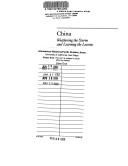| Listing 1 - 3 of 3 |
Sort by
|
Book
ISBN: 0674805356 1684172276 Year: 1980 Publisher: Cambridge Harvard university. Council on East Asian studies
Abstract | Keywords | Export | Availability | Bookmark
 Loading...
Loading...Choose an application
- Reference Manager
- EndNote
- RefWorks (Direct export to RefWorks)
Business and politics --- Capitalists and financiers --- #SML: Joseph Spae --- S04/0820 --- S06/0300 --- S10/0310 --- Financiers --- Investors --- Businesspeople --- Business --- Politics and business --- Politics, Practical --- Political business cycles --- China: History--1928 - 1937 --- China: Politics and government--Guomindang, Kuomintang (incl. ideology) --- China: Economics, industry and commerce--Money and banking: 1911 - 1949 --- Political aspects --- China --- Politics and government --- Business and politics. --- Capitalists and financiers.

ISBN: 0821344862 Year: 1999 Publisher: Washington, D.C.
Abstract | Keywords | Export | Availability | Bookmark
 Loading...
Loading...Choose an application
- Reference Manager
- EndNote
- RefWorks (Direct export to RefWorks)
S10/0251 --- S10/0310 --- S10/0330 --- S10/0420 --- S10/0581 --- China: Economics, industry and commerce--General works and economic history: since 1989 --- China: Economics, industry and commerce--Money and banking: 1911 - 1949 --- China: Economics, industry and commerce--Employment --- China: Economics, industry and commerce--Public finance and taxation: since 1949 --- China: Economics, industry and commerce--Management of state enterprises --- China --- Economic conditions --- Social conditions --- Economic conditions. Economic development
Book
ISBN: 1501752405 9781501752407 1501752421 1501752413 9781501752421 9781501752414 Year: 2020 Publisher: Ithaca
Abstract | Keywords | Export | Availability | Bookmark
 Loading...
Loading...Choose an application
- Reference Manager
- EndNote
- RefWorks (Direct export to RefWorks)
"For a very long time, silver was money, but in the late nineteenth century, much of the world adopted some variant of the gold standard. China, however, remained the most populous country still using silver, although the country had no unified national currency; there was not one standard, but many: silver coins circulated alongside chunks of silver and every transaction became an "encounter of wits." This book focuses on how officials, policymakers, bankers, merchants, academics, and journalists in China and around the world answered a simple question: how should China change its monetary system? As different governments in China attempted to create a unified monetary standard in the late 19th and early 20th century, imperial powers--the United States, England, and Japan--tried to shape the direction of Chinese monetary reform for their own benefit. This book argues that the Silver Era in World history ended due to the interaction of imperial competition in East Asia and the state-building projects of different governments in China. When the Nationalist government of China went off the silver standard in 1935, it marked not just a key moment in Chinese history, but in world history"--
Money --- Monetary policy. --- Currency --- Monetary question --- Money, Primitive --- Specie --- Standard of value --- Exchange --- Finance --- Value --- Banks and banking --- Coinage --- Currency question --- Gold --- Silver --- Silver question --- Wealth --- Monetary management --- Economic policy --- Currency boards --- Money supply --- History --- Monetary policy --- Legal tender --- Mints --- Fiat money --- Free coinage --- Scrip --- Currency crises --- Finance, Public --- S10/0300 --- S10/0310 --- S17/1200 --- China: Economics, industry and commerce--Money and banking: general and before 1911 --- China: Economics, industry and commerce--Money and banking: 1911 - 1949 --- China: Art and archaeology--Numismatics --- Gold standard, Silver standard, China in Great Depression, Chinese economic history.
| Listing 1 - 3 of 3 |
Sort by
|

 Search
Search Feedback
Feedback About UniCat
About UniCat  Help
Help News
News